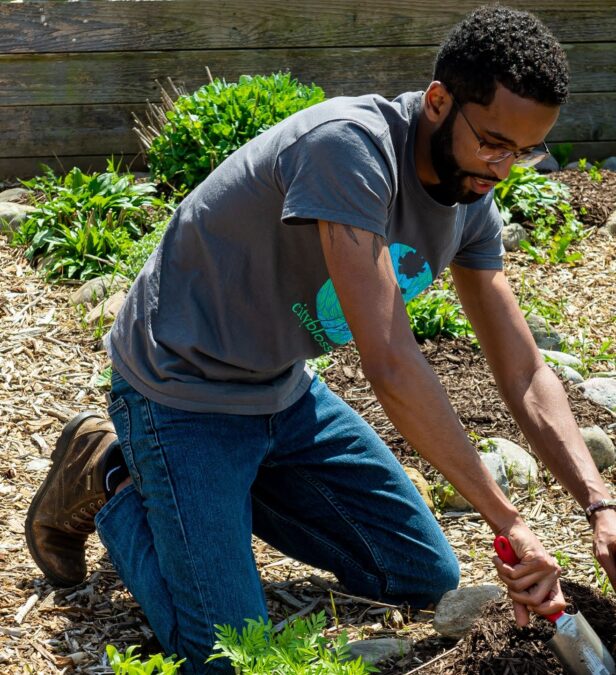This month’s professional spotlight is Rafael Woldeab Executive Director, City Blossoms. Read on to learn how Rafael turned a passion for environmental studies into a successful career ensuring equitable access to green spaces for Black, Latino, and immigrant communities.
Please briefly explain some of your responsibilities in your current career role.
City Blossoms’ mission is to cultivate the wellbeing of our communities through creative programming in kid-driven gardens. As Executive Director at City Blossoms, my main responsibility is to lead the creation and implementation of the organization’s vision and strategic goals. I represent the organization publicly and build strategic partnerships that further our mission. I also ensure our 13 staff members and 13 board members are supported and moving forward collectively.
How did you decide that this was the right career path for you?
Since middle school, I’ve been passionate about environmental studies as a subject. I remember learning about biomes in environmental club and my passion blossomed from there. I majored in Environmental Policy in college and took an internship on Heifer farm in central Massachusetts for a year after I graduated. On that farm, I had the opportunity to lead garden-based programming with children and youth, and fell in love with this work. Through this experience, I developed a deep passion for ensuring young people, especially those from Black and Brown communities, are connected to nature, to food, and to the holistic benefits of green spaces. Access to green space is critical for our emotional, physical, and communal wellbeing.
After my year on the farm, I knew I wanted to continue this work back in DC, my hometown, and fortunately found City Blossoms, whose mission is to ensure equitable access to green spaces for Black, Latino, and immigrant communities in D.C. I interned at City Blossoms in 2015, joined the board of directors in 2017, and in fall 2021, applied to the Executive Director role. For the past year and a half, I have had the honor of serving as Executive Director of City Blossoms.
Why is it important to have accessible green spaces in our communities?
In Washington DC, there is an inequitable distribution of safe, engaging, community-led green spaces and garden-based education. In under-resourced areas of our city, the green spaces available are often not activated or safe for children. Similarly, in under-resourced schools, garden-based education is often thought of as a “nice to have” rather than a necessity. Academic research tells us that open-access to green spaces is critical for urban residents to build a personal relationship with the earth and that nature-based programming is critical to the socioemotional and physical health of children, particularly those facing the multiple stresses associated with poverty and under-investment in their communities. Children and youth who live near safe, productive green spaces are often less stressed and more resilient. Active school gardens are associated with higher test scores, feelings of social connectedness, and increased interest in consuming healthy food.
Washington, DC is a resource-rich city, but suffers from extreme inequality. One out of every three children in DC lives below the poverty line – this is double the national average. 36% of all Black children under the age of five in Washington DC live below the poverty line. The same is true for 14% of Latino children under the age of five. We are a majority Black city (44% of DC residents are Black) but Black households are four times more likely to live in poverty in the District. These disparities are due to systemic racism that is perpetuated by inequitable access to resources like high quality education and green space. DC has a large amount of green space per capita but the quality and accessibility of that green space is very different between high-wealth and low-wealth neighborhoods. This is often called the “climate divide.” DC residents that live in wealthy areas of the city experience many health benefits that nature provides. But DC residents that live in lower-income communities have to cope with higher heat indexes, poor air quality, and polluted waterways.
What is the impact you hope your work will make on our world?
Not only do I wish to ensure all cities across the United States embrace access to green spaces for all communities, but I also hope to illustrate through my own career that a Black man and child of Eritrean immigrants can have a successful career in the environmental space. I grew up with a societal stigma around what types of career paths I should pursue as a man and as a man of color, but fortunately, I had parents who supported my career path in the environmental education space. The environmental field in general is still a white-dominated space, and the agriculture/environmental education field is woman-dominated, but I hope through my own journey that I can inspire others who are interested in pursuing an environmental degree or career pathway.
You’ve stepped out a little from the traditional career path (Doctor/Lawyer/Engineer) our parents want us to be on. How were you able to do that?
I owe a good portion of my professional success in the environmental field to a strong support system which I cultivated. In our culture, we are generally discouraged to ask for support. Further, patriarchal norms discourage men from reaching out when we are feeling stuck or needing advice. Fortunately, I learned in high school that there is nothing wrong with expanding my network and leaning on others who have come before me for advice. Not being afraid to build my network, meet professionals in my field for coffee, ask a friend or mentor for support with a resume/cover letter, etc. has proven instrumental to my success as an Executive Director. I can point to key moments in my career where I asked for support, or advice, or a connection, which resulted in meeting the right person or finding out about the right opportunity to propel myself forward.
What are the most rewarding and challenging aspects of your career?
One of the most challenging moments in my career so far was feeling stuck in a role I did not feel passionate about and felt limited in. I feel strongly that the culture we immerse ourselves in and the people we surround ourselves with impacts our success. This applies to both our personal and professional lives. In a previous role, I did not feel challenged, I felt myself becoming complacent, and lost motivation to further my own professional growth. After many months of feeling stuck, I sought out a career coach who supported me in shifting my mindset and rebuilding confidence in myself. I modified my resume, rebranded myself, started networking more, and soon enough, created more opportunities for myself to find another role at another organization that inspired me to grow professionally and personally.
One of the most rewarding moments in my career so far was accepting my current role as Executive Director of City Blossoms in 2022 at 29 years old. I battled through a lot of self-doubt and imposter syndrome when I applied for the role. I told myself I was too young, not experienced enough, out of my depth, but with the support of loved ones and a career coach, I worked through the fear and demonstrated through the application process why I am uniquely equipped to lead City Blossoms. Young people are incredible, we have innovative and creative ideas, we have passion and desire to make an impact where we see injustice, and I feel proud to have this opportunity to demonstrate to other young people of color that we have every right to take on leadership positions in whatever field we are passionate in.
You’re currently the Executive Director of City Blossoms; what advice would you offer to someone interested in working within the nonprofit sector?
As I mentioned above, and as it is widely known, developing your network is a critical foundation to achieving your career goals. What does this look like in practice? Here are two practical ways you can expand your network today and create a foundation for yourself to build on:
1) Create a LinkedIn if you do not already have one and keyword search for professionals who are in fields you want to be in or are in positions you are interested in learning more about. Reach out to those individuals and ask them for a 30 minute call or coffee. Learn more about how they got to where they are now and if they know anyone you should connect with. Repeat.
2) Find a mentor(s). This does not have to be someone in your immediate field. This can be a previous teacher or professor, a previous employer, or a previous academic counselor. The goal is finding people you can have regular check-ins with to hold you accountable for working towards your goals. It can also be helpful to check-in with a mentor ahead of a job interview, or if you need a revision of your resume. Having this foundation is incredibly helpful!
What do you do for fun outside your hard work and efforts toward building your career? Hobbies?
I love to grow food and plants, big surprise. I have a community garden plot that I tend to with my partner and with friends. There are so many amazing lessons you can learn about yourself and about nature through gardening – not to mention the mental health benefits. I also enjoy playing pick-up soccer, cooking, listening to live music, and dancing.

